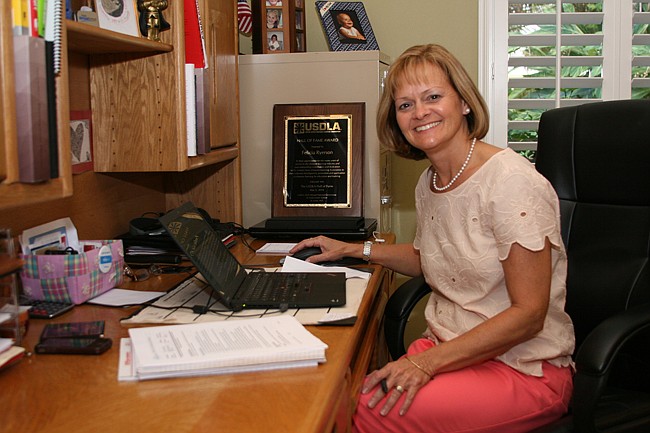- April 20, 2024
-
-
Loading

Loading

Felicia Ryerson’s days lecturing at the blackboard are behind her. Today the teacher embraces and excels at providing education enabled from another kind of board – no chalk or erasers needed.
Although she no longer spends her days in the classroom instructing elementary schoolers, Felicia Ryerson said she always keeps in mind lessons learned in the classroom when she’s clacking out virtual school lesson plans from behind a keyboard.
The lessons she learned as an instructor influence her daily as she now prepares other teachers to enter the sometimes alien-seeming world of virtual education.
“Teaching in a virtual environment is very different from the classroom, but I’ve found the same principles apply in both worlds,” Ryerson said.
Currently the Chief Learning Officer for Florida’s Virtual School, Ryerson has been there from the beginning, first helping to promote the school and now helping to develop new teachers.
For her efforts with Florida Virtual School, the Oviedo/Winter Springs resident was inducted into the United States Distance Learning Association Hall of Fame in May.
Ryerson helped develop training modules at FLVS to introduce teachers to the world of virtual instruction by first having them begin as students.
New teachers with the district are first telephoned and welcomed by a team member just as teachers are encouraged to do with their new students. Then, just like their future students, they attend their first training class online, learning how to navigate the systems and discovering for themselves the benefits and hang-ups inherent with virtual education.
“It’s just as important, if not more so, for online teachers to get to know their students. In the classroom this happens naturally, in the online world, teachers have to develop communication skills that allow them to ask questions and establish trust with their students,” Ryerson said.
It’s not uncommon, she said, for teachers and students to exchange stories about what they did on the weekend or over vacation breaks.
“For instance, teachers might ask a student how the football game they attended was or share some of their own vacation pictures as a way to connect with students,” she said.
Once new teachers assume their roles, they work one-on-one with students and their families, so establishing a bond built on trust is important.
“Students need to feel like they can share their challenges with their teachers,” Ryerson said.
Part of virtual education involves live sessions conducted by teachers with one or more students. Teachers can use these live sessions to teach in fun and different ways.
Many teachers run mini-contests during the live sessions, allowing students to compete against each other for prizes or bragging rights.
Some will even set up virtual game nights online, just for fun. They give teachers and students a chance to interact outside of the virtual classroom, just as game day in traditional classrooms gives students a chance to bond with their teacher.
Teachers are also encouraged to volunteer to represent FLVS at various community events such as Taste of Oviedo. This allows them the chance to interact with the community and meet potential students and families face-to-face.
Teachers who volunteer have also invited their current students to seek them out at such events, to introduce themselves in the “real” world.
Ryerson said that bridging the gap between traditional classroom instruction and virtual instruction is vital to the success of not only the teachers and students, but also FLVS itself.
Very early on FLVS recognized the need for ongoing teacher support and began their partnership with the United States Distance Learning Association.
Ryerson and her team have been called upon as consultants to help other schools set up their virtual classrooms and training programs.
Today pre-service teachers interested in becoming virtual schoolteachers can now do a portion of their required internship online, a program first introduced through the University of Central Florida’s College of Education.
This past year, 180 pre-service teachers completed online internships.
Aside from its rapid growth, the one thing that has surprised Ryerson most about online education are the opportunities for students and teachers to build relationships.
“The key to students’ success is the teacher’s ability to meet students where they are,” Ryerson said. “We are here to facilitate that.”